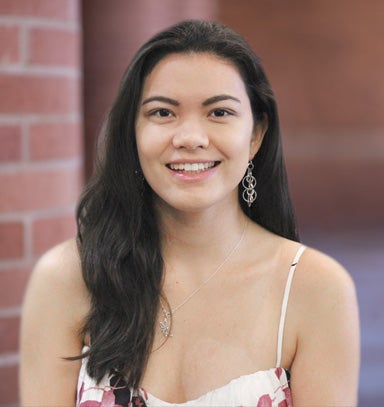Disability Awareness Week Amplifies Disabled Voices and Needs
Disability Awareness Week Amplifies Disabled Voices and Needs
UCLA’s resources for a diverse community of people with disabilities — and their allies
October 26, 2022


Carolanne Link
Did you know UCLA’s Office of Advanced Research Computing includes the DCP, or Disabilities and Computing Program? UCLA Anderson FEMBA student Carolanne Link (B.S. ’18, ’23) is project manager for OARC’s UCLA Web Accessibility Initiative. She and DCP colleagues offer monthly trainings on different topics like Web Accessibility Basics and Digital Accessibility Testing. They are technologists who promote inclusive, accessible design practices. They want to improve people’s access to UCLA resources, education and research, as well as increase awareness and allyship.
In October 2022, as the concluding event for Disability Awareness Week (DAW), the group held a special Disability Culture and Etiquette webinar. It was a safe space for people with disabilities and their allies to tell personal stories, and it was not recorded. “It is extremely vulnerable for disabled individuals to share their stories and for allies to discuss their learnings,” says Link, who was born with cerebral palsy. She’s intimately familiar with physical barriers in her environment, but she notes that “people forget about situational barriers, how certain circumstances can inflame disabilities and create unexpected, impromptu barriers.”
A Paralympic hopeful, Link serves on UCLA’s Committee on Disability and has served as UCLA Anderson FEMBA Council’s VP of equity, diversity and inclusion (2021–23). “Don’t be hesitant to engage with the disabled community,” she says. “The disabled community has a rich culture and welcomes new allies and friends.”
Common misconceptions about disability
- Disability can always be seen.
- Disabilities are static.
- You can tell what a person can and can’t do by looking at them.
- Accommodations are always readily available.
- University campuses are ideally set up for people with disabilities.
- All people who use a wheelchair cannot walk.
- Everyone with a disability has an obvious medical condition.
What you can do as an ally
- Recognize your own biases. Assume you don’t know what “disability” looks like.
- If you’re a professor, invite your students with disabilities to approach you privately about their expectations for access. Don’t “out” them to the entire class.
- Understand that the built environment isn’t engineered for physical or neurological disabilities.
- Respect accessible resources for the disabled population: take the stairs instead of an elevator when possible, don’t use disabled parking spaces and bathroom stalls.
- Get involved with the disabled community socially as well as by attending workshops and collaborating with accessibility departments.
UCLA Campus Resources
Disabilities and Computing Program
DCP employs accessibility engineers, including graduate and undergraduate students with direct experience facing obstacles to accessibility. The program’s goal is to facilitate integration of adaptive computing technology into campus instruction, study, research and employment, and to make information — including electronic text and multimedia — accessible to students, faculty and staff of every level of physical ability and neurodiversity. DCP will tailor sessions on demand to meet the needs of specific departments or groups.
UCLA Web Accessibility Initiative
UWAI promotes inclusive, accessible design practices. Its mission is to elevate the accessibility of UCLA’s high-priority, student-facing websites to meet W3C Web Content Accessibility Guidelines (WCAG) level AA standards.
UCLA Recreation’s programs for people with cognitive and physical disabilities expand their access to opportunities that promote physical fitness, health and wellness, increased self-esteem and greater functional independence. Adaptive Recreation educates the campus community on the lifestyle of individuals with disabilities in relation to recreation and sport, and provides opportunities for students and community members to volunteer. Specialized programs can be developed for groups and different populations.
UCLA Center for Accessible Education
CAE serves as a central source of disability-related information, procedures and services for the university student community. CAE provides expertise in determining and implementing appropriate and reasonable accommodations for academics and housing.